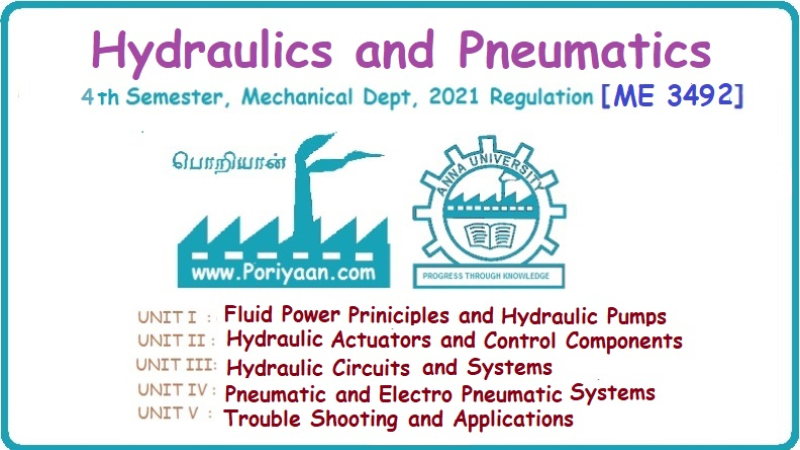Hydraulics and Pneumatics: Unit IV: Pneumatic and Electro Pneumatic Systems
Fluidics
Pneumatic and Electro Pneumatic Systems - Hydraulics and Pneumatics
Fluidics is the technology that utilizes fluid flow phenomena in components and circuits to perform a wide variety of control functions.
FLUIDICS • Fluidics is the technology that utilizes fluid flow phenomena in components and circuits to perform a wide variety of control functions. These control-functions include sensing, logic, memory, timing, and interfacing to other control media. • The term 'fluidics' is derived from two words 'fluid' and 'logic'. It is used specifically to describe the technology of the control of fluid force components by means of devices utilizing fluid interaction phenomena to produce useful output signals. • The fluidic devices control fluid power force components and fluid power master control components by the same media with which the force components are operated either gases or liquids. • In other words, fluidic devices perform their control function by a stream of gas or liquid directing itself through precision channels. The flow of media (stream of as or liquid) in this control method is quite similar to the apparent flow of electricity through wires and contact points. The basic characteristics of using fluids to control themselves offer various advantages over the conventional alternate control methods. Some of the important advantages of fluidic control systems are given below: 1. Fluidic devices offer exceptional thermal and physical stability and ruggedness, when compared to electronic control systems. (Through the electronic logic control systems are widely used, they are affected by temperature, shock, vibration, and radiation.) 2. Fluidic devices are completely insensitive to radiation, even of extremely high levels. 3. Fluidic devices are not affected by severe vibration and shock. 4. Unlike hydraulic and pneumatic control components, fluidic devices are not susceptible to wear and tear. In other words, since fluidic components do not have any moving parts, they virtually do not wear out. 5. Simpler construction and easier maintenance. 6. Highly reliable functionality. 7. Relatively low cost. 8. Interfacing capability can be easily accomplished with fluidics. Fluidic components can be interfaced to control pneumatic, electrical, or other systems.. 9. Since air is normally used as the working fluid within these devices, there are no problems of electrical noise, vibration, fatigue and contact contamination. 10. Since there is no arcing or sparking of switching elements, circuits employing fluidic devices can be operated quite safely in highly explosive or other dangerous environments. The two noteworthy drawbacks of fluidic control systems are: 1. Reaction time of fluidic control system is somewhat lower than that of electronic systems. However, fluidic devices do respond in milliseconds or speeds that are quiet adequate for most requirements. 2. Fluidic components normally operate at low power and pressure levels (below 1 bar). However these low-pressure signals can reliably control hydraulic systems operating with upto 700 bar or to provide the muscle to do useful work at rates upto several hundred horse power.1. What is Fluidics?
2. Advantages of Fluidic Control Systems
3. Drawbacks of Fluidic Control Systems
Hydraulics and Pneumatics: Unit IV: Pneumatic and Electro Pneumatic Systems : Tag: : Pneumatic and Electro Pneumatic Systems - Hydraulics and Pneumatics - Fluidics
Related Topics
Related Subjects
Hydraulics and Pneumatics
ME3492 4th semester Mechanical Dept | 2021 Regulation | 4th Semester Mechanical Dept 2021 Regulation
